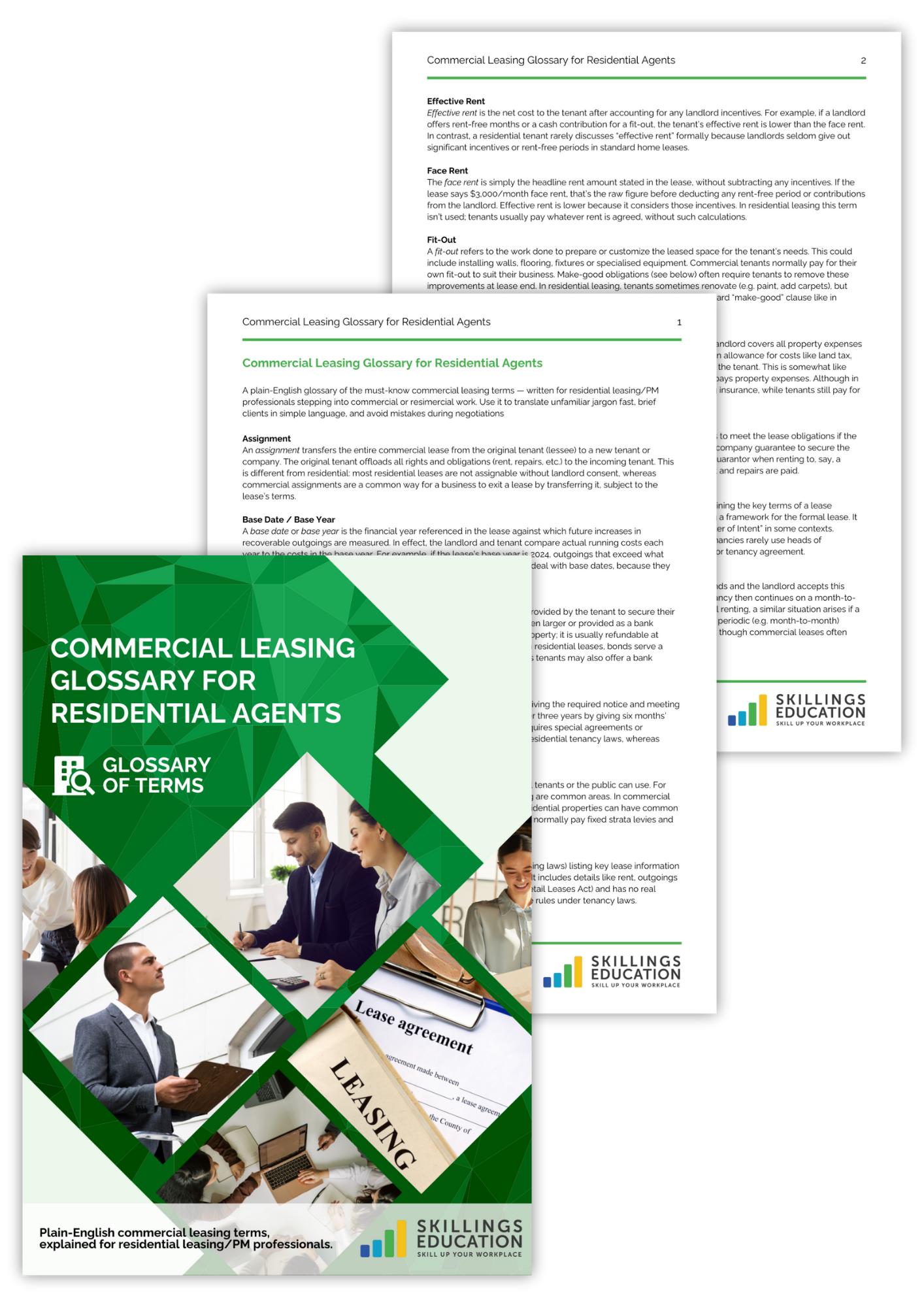Shifting from residential to commercial leasing calls for a different toolkit: how leases create value, which terms matter, and how the documentation flows from first interest to signed lease.
SKILLINGS Education helps you build those skills with practical, Australia-aligned training, templates, and support—so you can operate credibly with landlords, tenant reps, solicitors, and property managers.
The diagram shows where SKILLINGS Education can take you from common residential roles into commercial pathways, with potential salary increases of 20-40%.


.png)
Residential leasing/PM teams with strong local relationships who want to add small commercial leases without pausing residential income.
.png)
It depends on your state/territory and your current licence class. Check your regulator (e.g., Fair Trading/Consumer Affairs) and your agency’s licence conditions.
.png)
You’ll work through Proposal → Heads of Agreement (HoA) → Agreement for Lease (AFL) → Lease, with more stakeholders and confidentiality (NDAs) as standard.
.png)
Expect weeks to months. Plan pipeline and cash flow accordingly; build in follow-on work (renewals, rent reviews, options).
.png)
A CRM, email templates, a basic Effective Rent calculator, and explainer sheets for incentives, reviews, outgoings, securities, make-good.
.png)
Use a short engagement letter (scope, fees, timelines, confidentiality, not legal/financial advice). Maintain PI/E&O insurance and keep an issues log.
.png)
If the brief is large/complex (specialised uses, major works, unusual structures), co-list with a specialist and keep the client relationship.
.png)
Keep residential and commercial pages distinct, use consistent naming, and publish one or two local commercial case studies to establish credibility.
.png)
With practical training, checklists, calculators, and templates tailored to Australian practice—so your team can speak the language, price deals correctly, and deliver with confidence.
.png)

.png)
Not necessarily. Many hires come from agency PM or leasing. Show you understand owner outcomes (income up, vacancy down, smart capital expenditure spend).
.png)
Sometimes. Roles like Assistant Asset Manager, In-House Leasing Coordinator, or Portfolio/Investment Analyst are common entry points. The trade-off is stable base + bonus and a higher long-term ceiling.
.png)
Outcomes, not tasks: rent uplift %, vacancy reduction, annual income added, cost savings, simple payback on upgrades, portfolio size and asset types.
.png)
Budgeting & variance, simple underwriting (rent roll → income; capex → payback/ROI), renewal strategy, and stakeholder communication with owners, lenders and lawyers.
.png)
Helpful, not mandatory. Comfortable Excel and clear business cases beat complex models for most junior client-side roles. Advanced study can come later.
.png)
Less reactive work orders; more planning, analysis and meetings. Workload increases around budgets, reforecasts and major lease decisions.
.png)
REITs and fund managers, private landlords, developers, major corporates with large footprints, and government property units.
.png)
Requirements vary by state/territory and employer. Check your local regulator (e.g., Fair Trading/Consumer Affairs) and the job ad.
.png)
Volunteer for renewal plans, write a capex mini-business case, contribute to a quarterly portfolio report—then bring those as short case studies to interviews.
.png)
Excel is essential. Familiarity with portfolio systems (e.g., MRI/Yardi) and BI/reporting tools helps but can be learned on the job.
.png)
Courses at SKILLINGS Education are built for Australian professionals and focus on job-ready skills: owner metrics, budgeting/variance, renewal strategy, capex planning, risk/insurance basics, and stakeholder communication—plus templates, checklists and a certificate you can add to your CV.
.png)
No. Residential leasing gives you a strong base. Many candidates start with a small commercial brief or a support role (Leasing Assistant/Analyst, Lease Admin, Assistant PM) while they upskill.
.png)
Often, yes—commercial leases are larger and multi-year. The ranges in the diagram show typical AU salaries by role; many see a 20–40% uplift once established. Expect a ramp period and fewer (but bigger) deals.
.png)
Mostly no. Commercial inspections, negotiations, and sign-offs are usually Monday–Friday with business clients.
.png)
Typically weeks to months. Expect a staged process (brief/proposal → Heads of Agreement → Agreement for Lease → Lease) with more stakeholders (solicitors, PMs, contractors).
.png)
Understanding how lease terms drive cash flow (incentives, rent reviews, outgoings, securities, make-good), clear communication, and clean document handling. Basic Excel (calculating net effective rent) is a plus.
.png)
Results, not tasks. Example: “Renewals +5% vs prior, vacancy down 3 pts, +$120k annual rent.” Include building types, portfolio size, and any work on term sheets/renewals.
.png)
Often. Commercial leasing involves confidential terms (rents, incentives, outgoings). Share details only with qualified parties.
.png)
Leasing Assistant/Coordinator or Analyst, Lease Administrator, Assistant Property Manager (leasing focus). These roles build your commercial toolkit quickly.
.png)
Yes. A resimercial (hybrid) approach—maintaining residential while taking on small commercial suites/strata industrial—reduces income risk and builds case studies.
.png)
You don’t need investment-bank modeling. You do need to price to market, compare gross vs net rents, and compute net effective rent. You’ll also work with rent reviews (CPI/fixed/market) and understand outgoings and securities.
.png)
Requirements vary by state/territory. Check your local regulator (e.g., Fair Trading/Consumer Affairs) for the exact licence or registration needed.
.png)
Shadow a live lease, help with tours/admin, sit in on leasing discussions, or assist a local developer/landlord on a small brief. Turn each into a short, outcome-based case study for interviews.
.png)
Occupancy/downtime, renewal spreads, net effective rent, quality of incentives, and tenant retention.
.png)


Curriculum Focus: Investment analysis, property valuation, leasing negotiations, portfolio management, due diligence
Target Roles: Asset managers, development analysts, transaction advisors, tenant reps
Industry Tools: Deal evaluation models, lease abstraction workflows, negotiation templates



